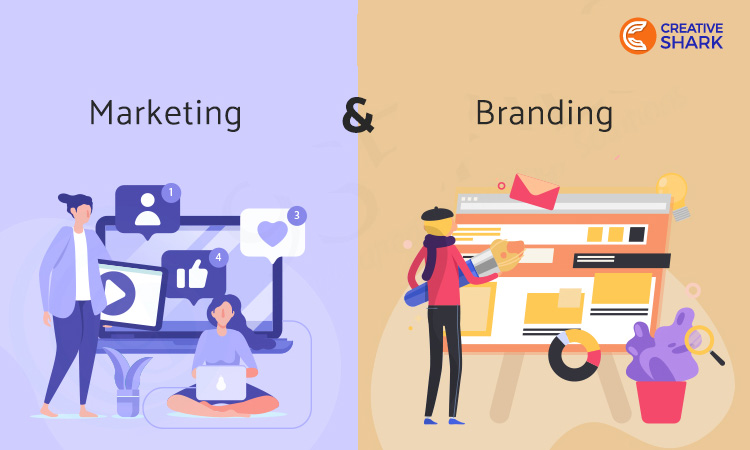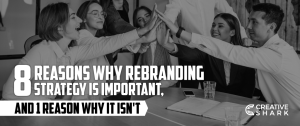Business stability and achievement stimulate all business operations and activities. While laying down the foundation of your business or maintaining an already established business, numerous measures can be taken to accelerate this process and generate profitable outcomes, like branding and marketing. Although the borders connecting these two are often vague, it is significant to address the difference between these two, exclusively to drive sales and build effective communication with the target audience, thus escalating the revenue.
One of the essential characteristics that branding and marketing share is the consumer’s Psychology. With the help of psychology, we can understand human behavior, emotions, and thought process to recognize their inner patterns, emotional reactions, and desires. It is interesting to note that both branding and marketing strategies aim to hit the touch points of consumers that trigger their emotions.
Developing a deep understanding of the thought process of your ideal consumer’s mind can lead to more effective marketing and branding campaigns. In contrast to what people believe, learning about psychology doesn’t make you read people’s minds, instead, it increases your awareness of the typical patterns that underlie human behavior and the consequences that these patterns might have.
Specific patterns can instill emotions in people, which can have a cascading influence on their behavior. For instance, the fear of losing out can inspire your consumer to make a purchase promptly.
In this article, I have unveiled the effects of psychology on consumer buying behavior in creating a strong brand identity and maximizing revenues.
But Wait…
You must be wondering what branding and marketing are. Are both the same things? Do they share the same characteristics?
Let’s find out.
Before jumping to the psychological effects, I will quickly take you through the differences between both branding and marketing. I will also give an overview of the types of various types marketing that exist nowadays and how they differ from brand marketing.
Branding Vs Marketing…Major Differences
Read More...
Meaning
Branding is a group of actions to create a powerful, unique, and unforgettable image, name, logo, or mark symbolizing a brand or service in the mind of consumers. Whereas marketing is promoting attributes of brands or services to sell out.
Objective
While the objective of branding is to build loyalty and trust with consumers, marketing is aimed at creating awareness to elevate the brand and build a profitable customer-brand relationship.
Impact
Branding has an impact on the consumer’s decision to buy a product. On the other hand, marketing has an instantaneous impact on a consumer’s buying choice.
Worth
Branding reinforces the product’s actual value, whereas marketing pass on the product’s proposed value to consumers.
Drive
Long-lasting brand loyalty and reputation are fueled by branding. However, marketing is what propels sales.
Outcome
Marketing generates a need for the consumer, but branding’s ultimate goal is the development of relationships between buyers and sellers.
Brand Vs performance marketing
Performance marketing is a form of online marketing in which an advertiser pays an affiliate to generate more leads, sales, and other revenue-generating activities. On the other hand, brand marketing is developing the visual identity, values, and personality of a brand and building long-term relationships with audiences.
Brand Vs communication marketing
Communication marketing is a type of marketing in which we use various mediums to communicate the message of the brand to the target audience. How we tell a brand story through various mediums such as advertising, direct marketing, branding, packaging, etc.
Brand Vs product marketing
In product marketing, we bring the product to market and analyze its overall success by driving demand and usage.
Do brands need smart marketing strategies to grow or their success merely depends upon man’s buying behavior?
One of the key attributes of being a successful marketer is to understand the behavior of your target audience how they think and how they react to a certain stimulus. It would help you in creating more compelling content marketing. Understanding some fundamental psychological concepts can transform your marketing from good to outstanding and that’s only because the right audience will be reading it, relating to it, and many will convert to it, too.
Principles of marketing psychology that affect the consumer’s behavior
The following principles may help you in devising an effective marketing strategy to reach your profitable prospect.
-
Reciprocity
It is important to offer a product or service to your consumers that has genuine value only then the consumers will give you back in return. You can offer them free downloads, samples, free consultation, free content, etc and the list will go on.
-
Share social evidence
The client’s reviews and testimonials develop trust among the target audiences to avail of your service or buy your product.
-
Loss aversion theory
People don’t like to feel the loss. The feeling of losing something you already have is more powerful than the joy of gaining something new, which is why a common emotional reaction is to protect what you have at all costs. You can give a free trial to your customers.
-
Make the supply limited
Offer a limited supply and if consumers will not act quickly they will miss out on their favorite stuff.
-
Remove biases & confusion
To do this, show a completely transparent picture of your company’s principles and ensure that your online content and social media selections reflect those values in a clear, consistent manner.
Human psychology affecting brand’s performance
How does human psychology affect the performance of a brand?
Consumers believe that they choose a brand because of its quality performance or cost. However, psychologists perceive this phenomenon differently. Many psychological studies suggest that our emotions and identities have a great impact on the brand that we may choose. The survey of 1400 advertising campaigns from the past three decades highlighted that ads with strong emotional messages outperformed more rational and realistically.
Emotions: influencing the brand choice
It has been observed that emotions influence the consumers-purchasing decisions in a way that they hardly pay attention to the information or facts of brands. For example, if we look at the advertising campaign ‘Get a Mac” launched by apple in 2006, consumers may perceive the computer shown in the ad as a young cool guy. It humanizes the attributes of Apple Mac and an individual will start assuming to have a personality like Mac.
This is the reason most well-known companies adopt characteristics that customers identify with or aspire to imitate, such as young, cool, wealthy, or seductive. It’s uncertain that your brand will evoke feelings of love and emotions if it doesn’t synchronize with the true or intended identity of your target audience.
Key takeaways
In my opinion branding and marketing go hand in hand. They both are interdependent. Psychological knowledge plays a significant role in your content marketing plan and branding to convey a strong message that will connect with your readers deeply, meet their requirements, and influence their decision to purchase your goods or services. This knowledge leaves the possibility for manipulation, which is a side of marketing that nobody wants to witness.
Use these tools ethically and honestly to interact with real customers and fulfill their requirements to gain loyal customers. False advertising and hollow promises will eventually backfire and seriously harm your brand’s reputation. Any marketing campaign’s most crucial component is trust, which is nearly impossible to rebuild once lost.
Get in contact with Creative Shark’s content delivery experts right now if you need assistance tailoring your content marketing plan and branding strategies to your audience’s demands.
Read Less











